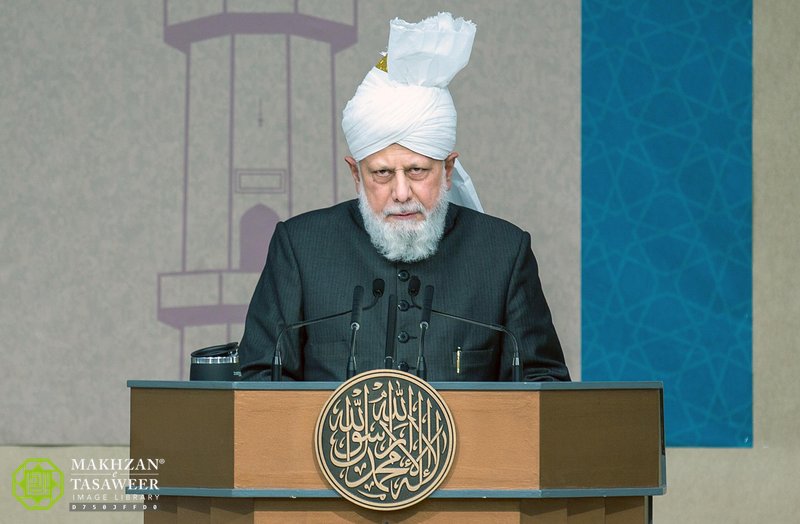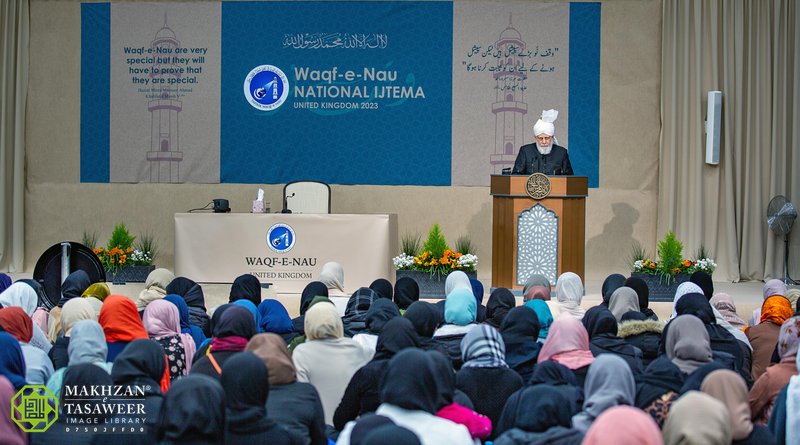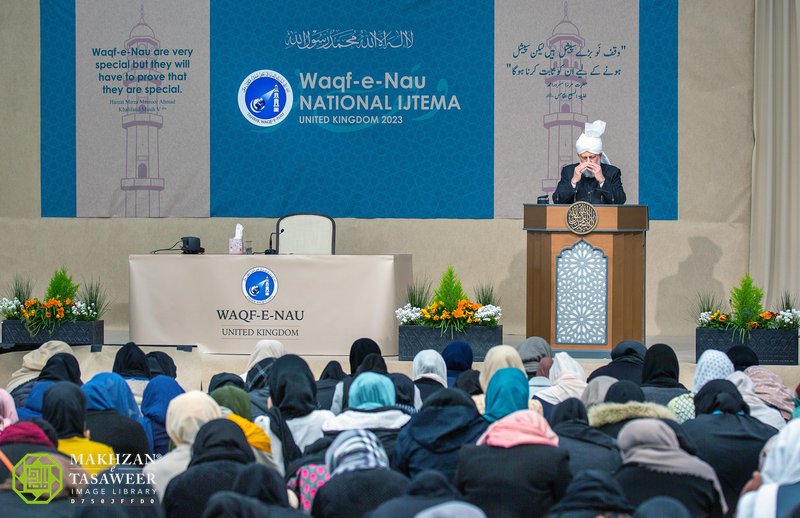Address by Hazrat Khalifatul Masih V(aba) at Waqfaat-e-Nau Ijtema UK 2023 on Saturday 29th April 2023, from Baitul Futuh Mosque, London, UK.

After reciting Tashahhud, Ta‘awwuz and Surah al-Fatihah, Hazrat Khalifatul Masih V(aba) said:
‘With the grace of Allah, today the National Waqfaat-e-Nau UK Ijtema is taking place once again. As you are aware, Waqfaat-e-Nau comprise those women and girls within our Jama’at whose parents dedicated their lives to the service of their faith and religion prior to their birth. As Waqfa-e-Nau, your absolute and unconditional priority must remain your faith and religion over all other things. And so today, I wish to briefly speak about what it actually means to give precedence to your faith. Once you comprehend what it means to prioritise and value your faith over all else, it will have a profound effect upon how you live your life. It will drive you towards the process of self-reformation and enable you to serve the Jama’at in the best possible way.
A person who gives priority to their faith as a Muslim will naturally be inclined towards living a moral life. Such a person will seek to instil within themselves those values and qualities Islam advocates. If you consider your faith to be preeminent, you will also have an extremely positive influence on others and society at large.
Certainly, at a time when the world is becoming increasingly godless, it is the principal duty of the members of the Waqf-e-Nau scheme to bring people back towards God and prove a means of spreading the true religion of Allah the Almighty all around the world. In order to achieve this, you must recognise your true value and status. You are the girls and women who have the potential to play outstanding roles in bringing about a spiritual and moral revolution in the world because you are the followers of the Promised Messiah(as), who came in accordance with the prophecies of the Holy Prophet of Islam (sa).
The Holy Prophet(sa) foretold that following a period of spiritual malaise, at a time when Muslims had deviated far away from Islam’s teaching, Allah the Almighty would send the Promised Messiah(as) to revive the original teachings of Islam and bring humanity back towards their Creator. Therefore, the Promised Messiah(as) was sent by Allah the Almighty to enlighten Muslims and non-Muslims alike about Islam’s teachings and to establish His chosen religion in the world.
Of course, having accepted the Promised Messiah(as), all Ahmadis must fulfil the pledge of their bai’at. Nonetheless, having dedicated your lives for the service of your religion, you have an even greater responsibility than other Ahmadis to ensure that you give precedence to your faith over everything else. Each of you must play your role in seeking to fulfil the grand objectives of the Promised Messiah(as), which, in simple terms, are to fulfil the rights of Allah the Almighty, the rights of His creation and to strive to establish His teachings in the world. Hence, you must inculcate the highest moral standards and set an example for others to learn from and follow.
Through your words, and especially your deeds, you must educate and inspire others towards the fact that, as human beings, we must fulfil each other’s rights and live in peace and harmony. You must guide others about the importance of upholding human values and treating one another with love, kindness and respect. However, you cannot expect to influence others until you yourself are acting upon Islam’s teachings.
In this regard, the foremost duty of a Muslim is to worship Allah as He desires. Accordingly, as members of the Waqfaat-e-Nau scheme, you must always protect and safeguard your prayers. Consider Salat to be your constant companion. It should not be that you delay or miss any prayers because of your worldly affairs or education. Do not be lazy or fall prey to weak excuses that take you away from Allah’s worship. Rather, ensure you offer Namaz on time and with deep care and concentration. Occasionally, due to bad weather or other genuine reasons, Zuhr and Asr, or Maghrib and Isha can be combined, but even then, they should be offered at the earliest possible time.
Furthermore, a Muslim should recite and ponder over the Holy Qur’an each day and strive to act upon its teachings. As Waqfa-e-Nau, you have pledged your lives for the service of your faith, and so it is especially incumbent upon you to study the Qur’an and identify its various teachings. Every command of the Holy Qur’an is vitally important and must not be taken lightly. Apart from instructing us to worship Allah the Almighty, the Holy Qur’an contains many other instructions concerning self-reformation and fulfilling the rights of our fellow beings.
For example, the Qur’an lays great emphasis on fulfilling the rights of one’s parents. Where it has established the rights of women and girls, it has also laid down their responsibilities. Allah the Almighty says that believing women should protect their chastity and modesty at all times and observe pardah. A fundamental reason for this Qur’anic injunction is to safeguard and protect women from harassment by men and to ensure that no man dares to cast even an inappropriate glance in their direction or to have impure or ill thoughts towards them. Rather than restricting a woman, hijab is the means of liberating them from the gaze of men.
It is true that in the non-Muslim world, the concept of purdah and the hijab has long been criticised. Yet now, certain non-Muslims are actually calling for safeguards that mirror Islam’s teachings. They are coming to realise the need for caution following reports of countless cases of men harassing and abusing women at all levels of society. Relatively recently, a survey found that 97% of women aged between the age of 18 and 24 in the UK had been harassed by men. Across all age ranges, 70% of women said they had faced sexual harassment in public. As a result, there have been calls to establish safe spaces for women or to have women-only events.
Similarly, recently a new report found that many women and girls in the UK were leaving sports and exercise because they felt uncomfortable and as though they were being sexualised by being forced to wear sports skirts that exposed much of their bodies. Thus, you should never harbour any form of inferiority complex or embarrassment regarding the hijab or any other of Islam’s teachings. Instead, you should feel pride in your religious beliefs and be confident in the expression of your faith. Certainly, there is no Islamic injunction or restriction that is without reason or logic. Each Islamic teaching is based upon human nature and the means for ensuring societal peace and harmony.
There is no getting away from the fact that today, at every turn, lies immodesty and vulgarity, be it on television, social media, or in public areas such as beaches, parks, or other places of recreation. In such circumstances, every Ahmadi girl, and especially every Waqfa-e-Nau girl, must show strength of character and pay great care and attention to protect her chastity and modesty of dress. You must seek to embody Islam’s teachings in all respects. Only then will you be able to fulfil the pledge you have made to reform yourselves and to strive to ignite a spiritual and moral revolution in the world.

Another virtue the Holy Qur’an has laid great emphasis upon is truthfulness. Allah the Almighty has said that there should not be even the slightest indication of falsehood or deception in one’s words or deeds. Even when it comes to joking, one should not say anything misleading or false. Furthermore, Islam teaches that a person should treat his relatives with love and affection, and Waqf-e-Zindagis and Waqfa-e-Nau should try to manifest this quality even more than others.
With the grace of Allah, the Waqf-e-Nau scheme has reached a stage where many of the early Waqfaat-e-Nau girls are now mothers. Indeed, even many of those born some years later are now married and starting their families. The responsibilities of such Waqfaat-e-Nau are much increased. Where before, they had to concentrate primarily on their own moral state, now they are also directly responsible for the moral training of the next generation of the Jama’at. To fulfil this duty, Ahmadi mothers must manifest the highest standards of worship of Allah and inculcate within themselves the very best morals. Most of you have been brought up and educated here, and so you understand this society and recognise its ills and vices. Utilise this knowledge to not only save yourselves from its ill effects, but also to guide your children so that they avoid the moral pitfalls and traps that await them as they grow and develop.
Without a shadow of doubt, it is the great challenge of the time for Ahmadi mothers to ensure that our future generations remain attached to their religion. Moreover, be ever mindful of your duty to bring people towards God. To achieve this, every Waqfa-e-Nau must start with their own home. Treat your younger siblings and children with love and care and strive to nurture the love of Allah within their hearts. Thereafter, reach out to your neighbours, friends and the wider world.
Never waver in your efforts to develop a righteous society in which the teachings of Allah the Almighty reign supreme. Be ready for every sacrifice for the sake of your faith, and take inspiration from those noble women of the past who attained the highest spiritual ranks. Unquestionably, in every era, righteous women have played an outstanding role for the sake of their faith and belief in Allah the Almighty.
For example, you see how the female disciples of the Prophet Jesus(as) excelled in faith and showed immense courage and loyalty after Jesus(as) was taken down from the cross and emerged from the tomb-like cave in which he remained for three days, it was Mary Magdalene and two other women who came to his aid. Despite facing the threat of grave punishment and retribution from the authorities, those brave women did not recoil in fear, rather, they showed far more courage and devotion than the male disciples. Rightfully, Christian women feel pride at the fortitude of those women who gave precedence to their faith and who, for the sake of Jesus(as) and his teachings, made great sacrifices.
Furthermore, the Holy Qur’an specifically mentions two very pious women: Hazrat Maryam and the wife of the Pharaoh. Both manifested exceptional faith in Allah and gave precedence to their belief in Him over all else. In the case of Pharaoh’s wife, she remained faithful to Allah even though she was the wife of a disbeliever.
History bears witness to the fact that during the blessed era of the Holy Prophet(sa), the sacrifices made by Muslim women reached new heights and shall forever remain an example for mankind. Some early Muslim women were subjected to inhumane cruelties and brutalities, yet they patiently tolerated all such atrocities and bore untold grief for the sake of their faith. Along with Muslim men, Muslim women were viciously tortured by the disbelievers of Makkah. They were forced to lie upon scorching sands and dragged for long distances as burning coals, or stones were placed on their bodies.
Once, the Holy Prophet(sa) observed a Muslim husband and wife, both of whom were slaves, being horrifically tortured in this way by their merciless master. They were forced to lie in the blistering heat upon boiling sands and were relentlessly beaten, and hot stones were placed upon them, all the while their owner demanded they renounce their belief in the Holy Prophet(sa). Despite their agony, they never once wavered in their faith. Upon observing their torment, the Holy Prophet(sa) became overwhelmed with emotion and grief and turned to Allah in prayer. The Holy Prophet(sa) addressed the Muslim husband and wife and counselled them to remain patient and gave them the glad tiding that they would receive the greatest of Allah’s reward and bounty soon.
Ultimately, as a result of the incessant torture, the husband lost his life. At that moment, when the Muslim lady had lost her husband, her owner still failed to show any mercy. Instead, he took a spear and violently pierced open her stomach, causing her death. In worldly terms, that woman had no rank or status. Indeed, as a slave, she was part of the weakest class of society and considered no more than a chattel or property of their owner. Yet, due to her absolute conviction in the truth of the Holy Prophet(sa) and her impeccable standards of faith, that lady, who the world looked down upon, scaled the highest spiritual peaks, and her noble status has been etched indelibly in history forevermore.
Another awe-inspiring example from early Islam is that of Hazrat Umm Amarah(ra), who demonstrated outstanding bravery and steadfastness far beyond many Muslim men during various battles in the early period of Islam. Likewise, we have before us the extraordinary examples of Hazrat Umar’s sister, who tolerated the wrath of her enraged brother in order to ensure the sanctity and dignity of the Holy Qur’an was preserved. Seeing his sister’s supreme level of faith moved Hazrat Umar(ra) and proved a watershed moment in his life, leading him to accept Islam.
Moving forward to this era, with the grace of Allah, many Ahmadi women have also rendered great sacrifices for the sake of their faith. In Pakistan, it is not only Ahmadi men who have embraced martyrdom; Ahmadi women have also given their lives for the sake of their faith. With unwavering courage, they remained firm in their faith till their last breath and never yielded to the brutalities and cruelties they were subjected to.
In reality, history is replete with the magnificent role Muslim women have played for the sake of their faith, and they serve as role models for all those Waqfaat-e-Nau who have pledged in this era to give precedence to their faith over all worldly matters. Always remember that such stories are not just for us to read about or to consign to history books. Rather, they ought to inspire us to remain firm in our faith and navigate the challenges of modern society.
Accordingly, every Ahmadi lady and girl, especially members of the Waqfaat-e-Nau scheme, must understand that now it is their turn to take up the mantle of being ready for every possible sacrifice for the sake of their faith. There are countless moral ills and vices prevalent in today’s society, and increasingly, people are abandoning religion. Under such circumstances, Waqfaat-e-Nau must take a stand for the sake of Allah the Almighty. You must strive to eradicate all traces of worldliness from your minds and ensure that you do not fall prey to these superficial attractions and glamour of the world. Instead, seek to live your lives according to Islam’s teachings. Be ever-willing by giving precedence to your religious convictions. Guard your faith and seek to establish an everlasting, living bond with Allah. Bow before Him in all humility and sincerely pray that you can effect a profound change in the world through tabligh and your righteous conduct.

Strive every day to play your role in uniting mankind under the banner of the Holy Prophet(sa) so that the people of the world join together as one in prostration before Allah the Almighty. If you rise to this challenge, you will fulfil the objective of your life and be able to claim that you are a Waqfaat-e-Nau, not just in name but, far more importantly, in spirit and deed.
Whether young or old, I reiterate that you must always seek to fulfil the righteous pledge made by your parents before your birth, which you later affirmed, of giving precedence to your faith over worldly matters and spending your lives in the service of Islam.
May Allah the Almighty grant you all the ability to do so. May you all fulfil your duties and be amongst those who bring about a true and everlasting spiritual revolution in the world, Ameen. Now, join me in silent prayer.’